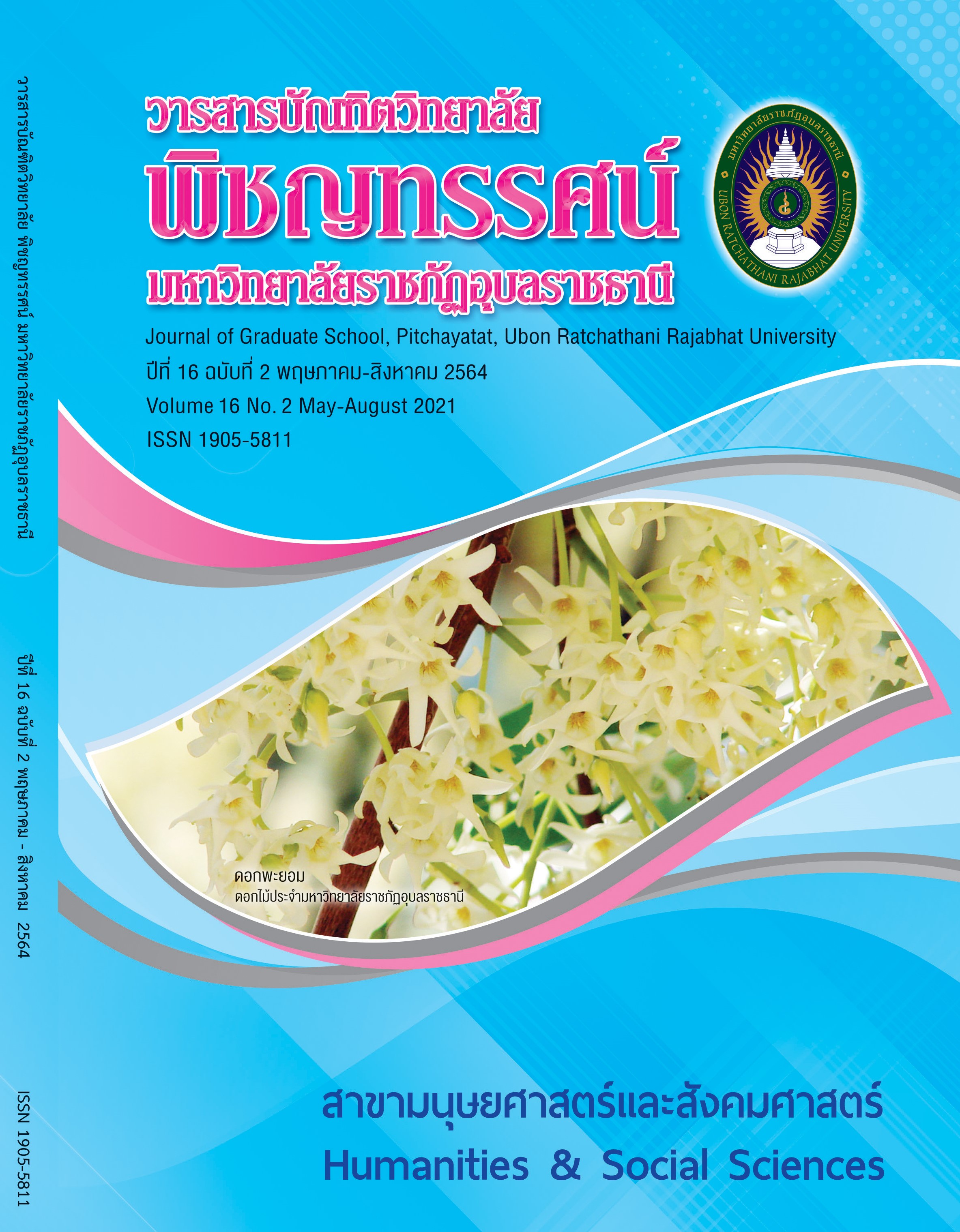การพัฒนาทักษะการสร้างสื่อการสอนดิจิทัลของนักศึกษาครูเพื่อส่งเสริม การเรียนรู้ด้านเทคโนโลยีของนักเรียนในจังหวัดสุรินทร์
คำสำคัญ:
สื่อการสอนดิจิทัล, การเรียนรู้ด้านเทคโนโลยีบทคัดย่อ
งานวิจัยนี้มีวัตถุประสงค์เพื่อ 1) พัฒนาทักษะการสร้างสื่อการสอนดิจิทัลของนักศึกษาครู 2) เพื่อศึกษาผลการเรียนรู้ด้านเทคโนโลยีจากการใช้สื่อการสอนดิจิทัลของนักเรียนในจังหวัดสุรินทร์ กลุ่มเป้าหมายที่ศึกษา ประกอบไปด้วย 1) นักศึกษาครูสาขาเทคโนโลยีสารสนและสื่อสารการศึกษาชั้นปีที่ 3 จำนวน 20 คน ได้มาจากการเลือกโดยเจาะจง 2) นักเรียนชั้นประถมศึกษาปีที่ 5 ในเขตพื้นที่ ต.สลักได อ.เมืองจังหวัดสุรินทร์ จำนวน 73 คน ได้มาจากการเลือกโดยเจาะจง เครื่องมือที่ใช้ในการวิจัย 1) แบบประเมินทักษะการสร้างสื่อการสอนดิจิทัล 2) แบบประเมินคุณภาพสื่อการสอนดิจิทัล 3) สื่อการสอนดิจิทัล AR 4) แบบทดสอบความรู้ สถิติที่ใช้ได้แก่สถิติเชิงพรรณา ค่าเฉลี่ยเลขคณิตและส่วนเบี่ยงเบนมาตรฐาน และการเปรียบเทียบค่าเฉลี่ยของผลการเรียนรู้โดย dependent sample t-test
ผลการวิจัยพบว่า
- ในภาพรวมผลการประเมินทักษะการสร้างสื่อการสอนดิจิทัลของนักศึกษาครูทั้ง 7 ด้าน โดยใช้เกณฑ์การประเมิน 7 ระดับ ตามทฤษฎีพฤติกรรมทักษะพิสัย 7 ด้านของ Simpson จากการประเมิน 3 ครั้ง มีคะแนนรวมสูงขึ้นจากอย่างต่อเนื่องทุกคน เมื่อพิจารณาจากคะแนนเฉลี่ยรวมของนักศึกษาทุกคนในการประเมินครั้งสุดท้าย พบว่า มีคะแนนเฉลี่ย 5.18 แปลความหมายได้ว่า มีระดับทักษะค่อนข้างมาก (การกระทำอย่างชำนาญ เป็นขั้นฝึกฝนการกระทำนั้น ๆ จนสามารถทำได้อย่างชำนาญ)
- คะแนนเฉลี่ยผลการจัดการเรียนรู้ด้านเทคโนโลยีจากการใช้สื่อการสอนดิจิทัลของนักเรียนในจังหวัดสุรินทร์ พบว่าผลสัมฤทธิ์หลังเรียนสูงกว่าก่อนเรียนอย่างมีนัยสำคัญทางสถิติที่ระดับ .05
เอกสารอ้างอิง
ดวงจันทร์ แก้วกงพาน. “การใช้เทคโนโลยีสารสนเทศและการสื่อสาร (ICT) ในการจัดการเรียนการสอนสำหรับนักศึกษาครูวิทยาศาสตร์เพื่อส่งเสริมทักษะในศตวรรษที่ 21,” บูรณาการงานวิจัยสู่การพัฒนาท้องถิ่นที่ยั่งยืน. การประชุมสัมมนาวิชาการและนำเสนองานวิจัยระดับชาติ เครือข่ายบัณฑิตศึกษา มหาวิทยาลัยราชภัฏภาคเหนือ ครั้งที่ 17;/ 21 กรกฎาคม 2560; หน้า 1007.
วศกร เพ็ชรช่วย. การพัฒนาสื่อความจริงเสมือนบนเอกสารประกอบการเรียนเรื่อง อุปราคาสำหรับนักเรียนชั้น มัธยมศึกษาปีที่ 3 โรงเรียนเศรษฐบุตรบำรุง. กรุงเทพฯ: คณะศึกษาศาสตร์ มหาวิทยาลัยเกษตรศาสตร์, 2557.
สุภาพร เสือเริก และจรัญ แสนราช. การพัฒนาบทเรียนคอมพิวเตอร์มัลติมีเดีย เรื่อง
คอมพิวเตอร์พื้นฐานด้วยเทคโนโลยีเสมือนจริง.สำหรับนักเรียนชั้น มัธยมศึกษาปีที่ 3 โรง
เรียนเศรษฐบุตรบำรุง. กรุงเทพฯ: คณะศึกษาศาสตร์ มหาวิทยาลัยเกษตรศาสตร์, 2560.
อุบลรัตน์ หริณวรรณ และคณะ. “สมรรถนะด้านเทคโนโลยีสารสนเทศทางการศึกษาของครู,” วิชาการศึกษาศาสตร์ คณะศึกษาศาสตร์มหาวิทยาลัยศรีนครินทรวิโรฒ. 15, 2 (กรกฎาคม-ธันวาคม 2557): 147.
Best, John W. Research in Education. 3rd ed. Englewood cliffs, New Jersey: Prentice Hall , 1981.
Simpson, E.J. The Classification of Educational Objectives in the Psychomotor
Domain. Washington DC: Gryphon House, 1972.
ดาวน์โหลด
เผยแพร่แล้ว
รูปแบบการอ้างอิง
ฉบับ
ประเภทบทความ
สัญญาอนุญาต
บทความทุกเรื่องได้รับการตรวจความถูกต้องทางวิชาการโดยผู้ทรงคุณวุฒิภายนอกอย่างน้อย 3 คน ความคิดเห็นในวารสารพิชญทรรศน์เป็นความคิดเห็นของผู้นิพนธ์มิใช่ความคิดเห็นของผู้จัดทำ จึงมิใช่ความรับผิดชอบของวารสารพิชญทรรศน์ และบทความในวารสารพิชญทรรศน์สงวนสิทธิ์ตามกฎหมายไทย การจะนำไปเผยแพร่ต้องได้รับอนุญาตเป็นลายลักษณ์อักษรจากกองบรรณาธิการ





